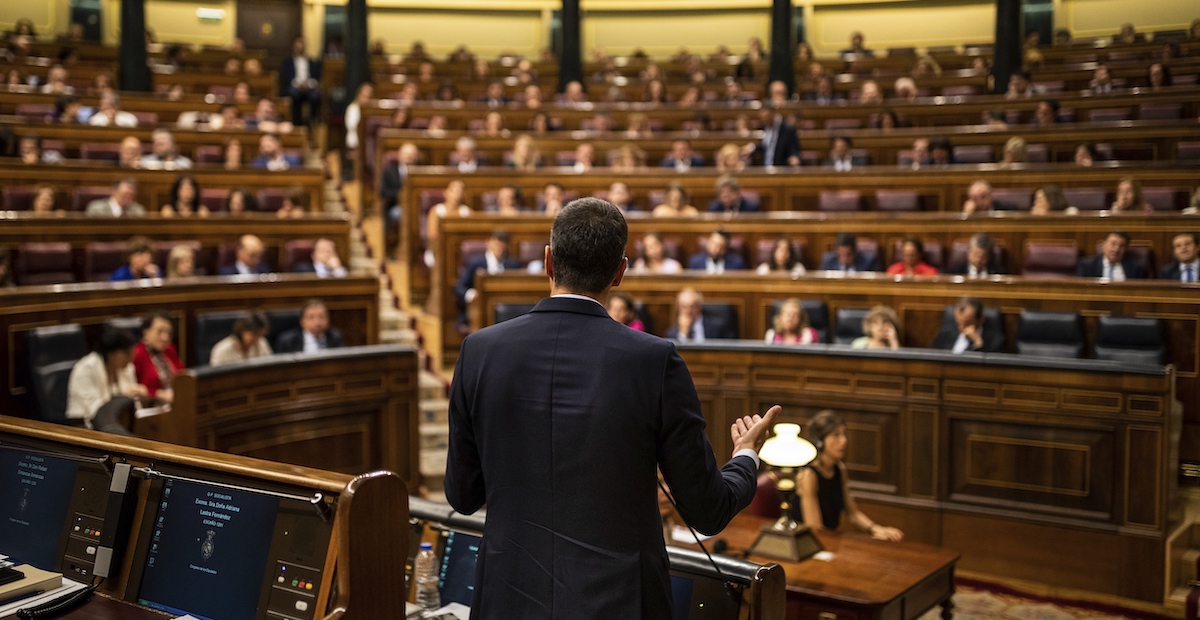We will understand something today, because Parliament meets for the first time after the elections: everyone’s attention will be focused on the leader of Catalan independence Carles Puigdemont
The Spanish Parliament meets for the first time in Madrid, Thursday, three weeks after the general elections at the end of July, in which no coalition succeeded in obtaining a sufficient majority to form the government. The first vote to be decided concerns the formation of the “mesa” of the Chamber, that is, the Presidency of the Republic: a very important body in the Spanish system, since it decides which proposals are to be accepted into parliamentary debate and has a great influence on progress. of legislative activity.
At the moment, the vote for Mesa (which consists of the President of the Chamber plus four Vice-Presidents and four Secretaries) is doubly important, because the discussions and alliances that will be formed between the two parties are in fact an anticipation of the alliances that will be formed for a vote of confidence in the new government: from the vote of Mesa, it will be possible to understand which of the two coalitions has the best chance of gaining enough seats to reach a majority, or if Spain risks going to new elections instead.
The current situation between the left-wing and right-wing coalitions is absolutely equal: the absolute majority in the Spanish Chamber of Deputies is 176 seats and both compositions 171. The left-wing coalition consists of the Socialist Party (PSOE), the radical left-wing Sumar. and some small Basque and Catalan regional parties. The right-wing coalition consists of the People’s Party and the far-right Vox party. With this composition, the main candidates for the post of prime minister (Pedro Sanchez from the Socialist Workers’ Party and Alberto Núñez Figo from the People’s Party) each received 171 votes.
Two parties remain outside these formations: the tiny Alliance of Canaries, which has only one deputy, and Juntes Per Catalunya (simply called Juntes), a centre-right Catalan independence party led by historic Catalan leader Carles Puigdemont. Puigdemont was the ruler of Catalonia during the illegal independence referendum in 2017, and for this he is being prosecuted by the Spanish judiciary: he is currently in exile in Belgium, in Waterloo, to escape arrest.
But the July elections made Puigdemont the deciding factor: he and Gontes would decide whether there would be a government in Spain, or if elections would be held again instead. And the seven deputies from Guntz, in addition to the 171 already available to the two coalitions, will allow them to overcome the absolute majority of 176 seats.
The Junts’ ability to support the right-wing coalition is unimaginable: especially since the Vox extremists have made the suppression of Catalan autonomy one of their most important electoral promises. The negotiations are taking place between Unites and the left-wing coalition led by Pedro Sanchez, which in recent years has shown itself to be in close dialogue with the Catalan forces and which is already supported by another autonomous centre-left party, the Equity and Reconciliation Authority.
The negotiations between Jontes and Sanchez are very complex, but the possibility arose Thursday morning that Puigdemont’s party would eventually support the left-wing coalition in voting for the new Mesa. In particular, the Spanish newspapers wrote that an agreement to elect a representative of the Socialist Workers’ Party, Francina Armengol, who was the governor of the Balearic Islands and who always had open positions towards Spanish regional movements, would be very close as the new president of the chamber.
However, the situation remains a certain degree of uncertainty, especially in light of the upcoming vote to form a new government. Of the various Catalan independence leaders, Puigdemont was often the most extreme and opposed any agreement with the Spanish national establishment, right and left. In the last legislative session, Juntes deputies voted against Sanchez in a vote of confidence, practically not supporting his bills. Puigdemont wrote on X (formerly Twitter) Wednesday that there remains a “deep mistrust, based on real facts.”
Els punts cardinals de la nostra posició no han variat, per més impressions i corredisses de darrera hora que hi hagi, i algun insult que se’ls descontrola. És a dir: no tenim cap confiança en els partits polítics espanyols, tota precaució és poco i les promises no ensescfen ni …
– krls.eth / Carles Puigdemont (KRLS) August 16, 2023
Reports about negotiations between Juntes and the Left remain vague, but almost all Spanish newspapers agree that Puigdemont is making ambitious demands. Among these, he would like all persons involved in the Catalan referendum processes to receive an amnesty and for Catalan to become one of the official languages used in the Spanish Parliament. It is also not yet clear how Sanchez, who had already made some overtures in the last legislature, will respond. Among other things, he pardoned imprisoned independence leaders in Spain (but not Puigdemont, who had escaped) and effectively eliminated the crime of sedition with which the Catalan leaders were accused.

“Reader. Travel maven. Student. Passionate tv junkie. Internet ninja. Twitter advocate. Web nerd. Bacon buff.”




